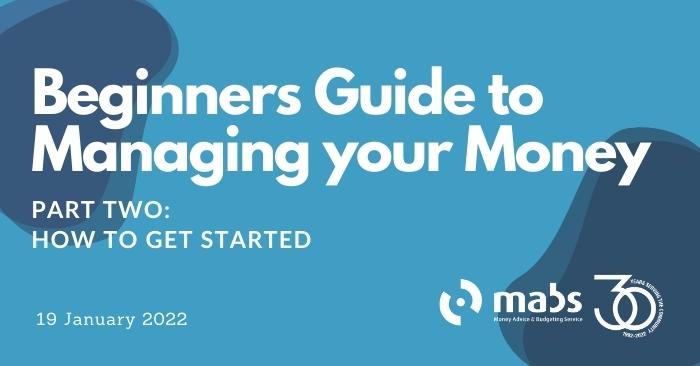Beginners Guide to Managing your Money

New Year, New You – a popular concept adopted by most of us every January. Lose weight, eat healthily, get fit…if you look up the top New Year’s resolutions every year, these 3 usually top the charts!
Believe it or not, being better with personal finances often makes an appearance. To be honest, it is one of the more achievable resolutions that a person can make. In fact, according to the Independent.ie, 20% said they would budget properly in 2022.
In MABS, everything we do begins with a budget (it’s in our name!) no matter how big or small your income is. In this series of blogs, we will simplify the process of budgeting or money management and outline the positives of keeping track of your household and personal finances.
We will refer to it as budgeting for the rest of the blog series for simplicity.
In part 1 of this blog series, we shared why you might want to create a budget. In this blog we will share information and tips to help you get started.
Let’s get started
Getting started doesn’t have to be complicated. Decide what works best for you – do you prefer a pen and paper? Or using an excel sheet or word document? Maybe an app on your phone is preferable. Whatever your preferred method of managing your budget is, go with it. If using pen and paper, maybe think about using a notebook or copybook, for your budget only. Keep it separate from all the other ‘to-do’ lists that can occupy our daily lives.
You can also try out our MABS budgeting tool to work out a budget plan. It shows how much money you have coming in and going out over a year and how much is leftover or short. The tool will calculate your numbers and show income and expenditure in weekly, monthly, and yearly amounts. You can save it and make changes as needed when you have looked at our money management pages.
Try not to overthink it when you start – a budget can be as simple as you want it to be. Budgeting allows you to gain control of your spending and support you in planning for the future.
What will I need?
Try and understand what your outgoings are every week, month, and year. For example, if you get 6 months of bank statements, it will give you a good idea of what goes out of your account on direct debits or standing orders (such as a mortgage, rent, utilities, and loan payments). It will also give you an idea of spending on food, transport (such as fuel or bus) and so on. Make sure to make a note of any yearly costs, such as NCT, and annual insurance.
Make sure you include everything – wages, social welfare payments, maintenance, pensions etc. If you decide to do a weekly budget, you will need to divide any yearly income by 52. If you get paid monthly but want to work out your weekly income, multiply by 12 and divide by 52.
For example, let’s say that your take-home pay is €1,500 a month. Multiply it by 12, which will equal €18,000. Then divide €18,000 by 52, which will equal €346.15 a week.
Could you maximise your income?
While you’re looking at your incomings and outgoings, why not look at possibly maximising your income. Are you claiming all your social welfare entitlements? Do you have medical costs that you can claim back? Are you getting all your tax credits, or are they shared appropriately between you and your partner? Or do you have a child turning 18 soon? If so, then you might lose their child benefit. This would be an essential change in your budget).
OK, I’m ready
When you have all your income details and a good idea of your outgoings, you are ready to start looking at your budget. Do one final check to make sure you haven’t missed anything.
Help is Here
If budgeting is a new concept to you or you are beginning to fine-tune your budgeting skills, our MABS website has great tools for supporting you. Advice on ‘How to budget’, ‘Living on a low income’ and ‘Planning for the Future’ are just some examples of our step-by-step guides on getting a handle on your finances.
Next Steps
Our next blog will focus on a budget based on family occasions and events you may have to attend or plan for in the coming year. If you’d like to do some additional reading or learn more about budgeting, visit How to Budget.
That’s all for now! Check back soon for more budgeting top tips.
Call the MABS National Helpline on 0818 07 2000 Monday to Friday, from 9am to 8pm, WhatsApp 086 035 3141 or request a callback if you want to talk confidentially about budgeting, problem debt or general financial matters.




Facebook
twitter
Instagram